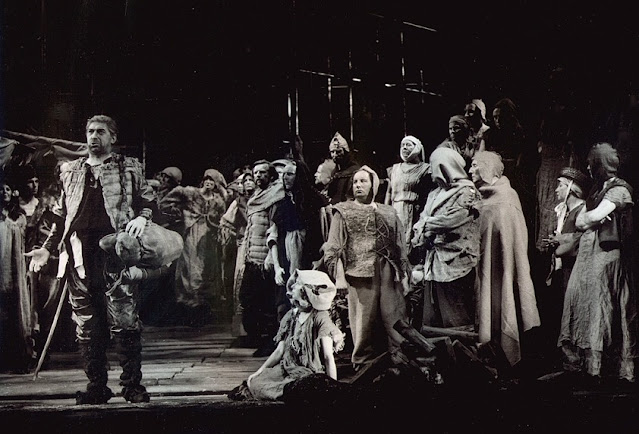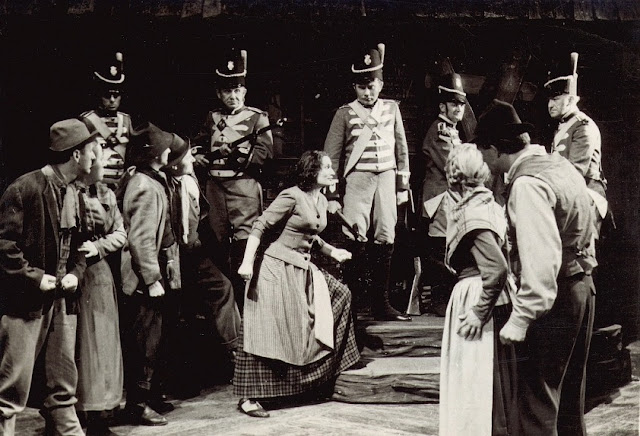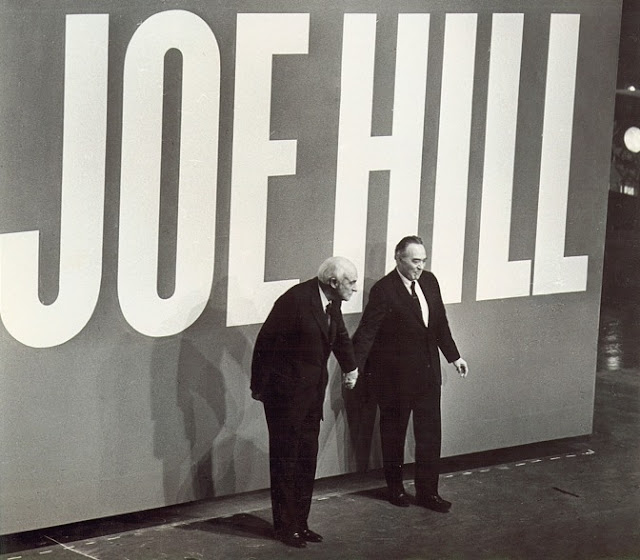 |
| Alan Bush: Wat Tyler - Keynote Opera Society, Sadlers Wells, June 1974 - Wat Tyler (John Noble). |
His first opera won a prize in the Arts Council Festival of Britain Competition of 1951, was broadcast on the radio in 1952 which led to many stage productions. Its stage premiere in 1953 was applauded for 25 minutes. The success resulted in further commissions, his second opera was premiered in 1956 with further productions in 1957, 1959 and 1960. His third opera arose directly out of the success of the second, being premiered in 1966 with further productions in 1969 and 1973. His fourth and last opera premiered in 1970. That is a record matched, I suspect, by few post-war British composers except Britten and perhaps Tippett.
The composer of this amazing run of operatic success was of course Alan Bush; the premieres and many of the subsequent performances took place in East Germany.
Many of the operas were broadcast in Germany and the BBC took recordings and broadcast them on Radio 3 (it would be curious to know whether these exist and could be rebroadcast). However, Bush's reputation after the war suffered because of his continued espousal of the Communist cause (a cause he felt strongly about right into old age) and British performances were minimal. But the operas themselves are hardly highly controversial. though they have plots which are related to the fate of workers, the plight of the working man, are not exactly didactic or directly political. They simply tell rattling good stories and, as far as I can tell, do so admirably and directly. Certainly the critical reaction from British critics was positive, and many reviews comment that the music deserves to be heard in the UK.Whilst there have been several student performances in the UK, the only professionally staged production of an Alan Bush opera in the UK remains the 1974 performances of Wat Tyler at Sadler's Wells Theatre, in a production featuring John Noble as Wat Tyler, Joseph Ward as King Richard II, Valerie Masterson as Margaret (Wat Tyler's wife) and Richard Angas as John Ball. In his review of the production, Desmond Shawe-Taylor wrote "I should like to see what the Welsh National Opera could make of such a work; it seems a natural choice for them…" The reviewer in The Guardian wrote, "There is nothing in this score to alarm or bewilder anyone who has heard with any pleasure, say, the Vaughan Williams of the Second and Fifth Symphonies; in fact, there are many easily remembered ballad-like tunes, in which Bush uses a folky idiom almost as naturally as Vaughan Williams does himself. But far from being a ballad opera, or anything like it, this work is musically and, on the whole, dramatically coherent and urgent."
 |
| Alan Bush: Men of Blackmoor - Leipzig, October 1959 |
Thanks in part to his centenary in there is a goodly amount of Bush's music on disc, notably chamber music, organ works, piano music (Bush was himself a very fine pianist), three of his symphonies, concertos, song cycles and more. There is plenty available to get a rounded idea of Bush as a composer, though in fact he was enormously prolific and his opus numbers run well over the 100 mark. But there are no operas on disc. Just nothing.
His first opera Wat Tyler received its stage premiere in Leipzig in 1956, though it had already been broadcast on East German radio as well as having a private performance with piano in London. It tells the historical story of the Peasants Revolt, and though the opera focuses as much on the people, the chorus, as on the individuals concerned, it is certainly not political in any sense that might frighten the horses. As with the neglect of Ethel Smyth's operatic output, we should not necessarily expect to rediscover a forgotten masterpiece but by all accounts Bush's operas were highly effective dramatic vehicles and surely that deserve the odd outing.
Wat Tyler and the following two operas, Men of Blackmoor and The Sugar Reapers all had librettos by Bush's wife Nancy. Highly effective librettos too.
 |
| Alan Bush: The Sugar Reapers - Tartu Opera House, Estonia, 1969 – the producer, Kaarel Ird and the composer, Alan Bush |
Men of Blackmoor, which premiered in Weimar in 1956, is based upon the history of the miners of Northumberland and Durham between the years 1800 and 1835. Andrew Porter wrote of the opera "Various other East German opera houses have taken it up. It is easy to see why, for it is a well-made piece…Alan Bush is a very professional composer. He has made extensive use of Northumbrian folk music, but integrated it into a continuous texture. The harmony has a good solid quality which sometimes recalls Hindemith…The best passages are probably the choruses, with their simple vigour and not so simple rhythmic subtleties, which keep them from squareness. Occasionally Mr. Bush strikes through to a lyrical idea that catches at the emotions, for example Jenny's entry in the final scene; it looks straightforward in the score, but comes off wonderfully in performance…It is not a dull opera, and it is easy to see that it could be a stirring one with a dynamic German production, powerful choruses and robust soloists."
The Sugar Reapers, which premiered in Leipzig in 1966, takes a contemporary subject, the struggle of the people of Guyana against the oppression of the British colonial regime and those who serve its interest. The historical background is the victory of the People's Progressive Party in the year 1953.
 |
| Alan Bush: Joe Hill, The Man Who Never Died - World Premiere: Deutsche Staatsoper, Berlin, September 1970 The librettist, Barrie Stavis and the composer, Alan Bush. |
The final opera, Joe Hill has a libretto by the playwright Barry Stavis, based on Stavis' play The Man who never died. I was lucky enough to meet Alan and Nancy Bush; I went out to their house in Radlett in the early 1980s in search of Bush's workers' songs. The composer was wonderfully helpful, lending me material that was long out of print, and we were treated to tea and scones with Mrs Bush, where the conversations moved between music, swimming with Brecht and his wife in Copenhagen and all sorts of other fascinating topics such as at the premiere of Joe Hill, Barry Stavis was distressed that the words were largely inaudible, something that Mrs Bush said she had learned to get used too.
The premiere of Joe Hill was at the Deutsche Staatsoper in Berlin in 1970. The work is about the American labour icon Joe Hill who, in 1914, was convicted of murder in Utah and sentenced to death by firing squad, igniting international controversy; many believed Hill was innocent, condemned for his association with the Industrial Workers of the World.
Alan Bush's post-war musical style, which he deliberately simplified, perhaps did not chime with the musical climate in the UK, but we have in more recent years learned to enjoy and discover a wide variety of 20th century musics. After all, if Bush's symphonies can be recorded on disc, why not his operas. I do wonder whether the operas sheer success in East Germany is an off-putting factor, easy to dismiss them as 'political works' without ever bothering to explore further.
Further information about Alan Bush and his music from the Alan Bush Trust's website.
Never miss out on future posts by following us
The blog is free, but I'd be delighted if you were to show your appreciation by buying me a coffee.
Elsewhere on this blog
- Crossing boundaries between contemporary classical, experimental electronic, ambient and electroacoustic - Matthew Whiteside's Remixes - record review
- Spirit and abandon: Ethel Smyth's Mass at the BBC Proms returns the work home, to the hall where it premiered in 1891 - concert review
- Prom 43: Handel's Solomon from Sofi Jeannin, BBC Singers, the English Concert & Iestyn Davies - concert review
- Different ways of doing things: Michael Wolters' Aria Cuntata and the Low Miracles from Birmingham Record Company - record review
- Seductive craziness: loosely inspired by Martial and Aristophanes, the opera Xeniae by Latvian composer Juris Abols is a polystylistic extravaganza - record review
- Florian Klaus Rumpf takes us on A Mandolin's Guide to Hamburg - record review
- Prom 39: a Turnage premiere, a Vaughan Williams rarity and an Elgar Symphony - concert review
- Ethel Smyth in lighter mode: The Boatswain's Mate returns to the Grimeborn Festival - opera review
- Embrace: Swiss baritone Äneas Humm draws you into his imaginative look at the edges of the 19th and 20th century lieder tradition - record review
- Matters of the heart: a warmly communicative journey through Schumann's Frauenliebe und -leben with Sarah Brady and Stephen Delaney - record review
- Operatic wit and style in the West End: Donizetti's Rita at the Charing Cross Theatre - opera review
- Colour and movement: Gilbert & Sullivan returns to Opera Holland Park with HMS Pinafore - opera review
- Home











No comments:
Post a Comment